2022届高考英语二轮复习:虚拟语气考点设置与解题策略课件(31张)
文档属性
| 名称 | 2022届高考英语二轮复习:虚拟语气考点设置与解题策略课件(31张) | 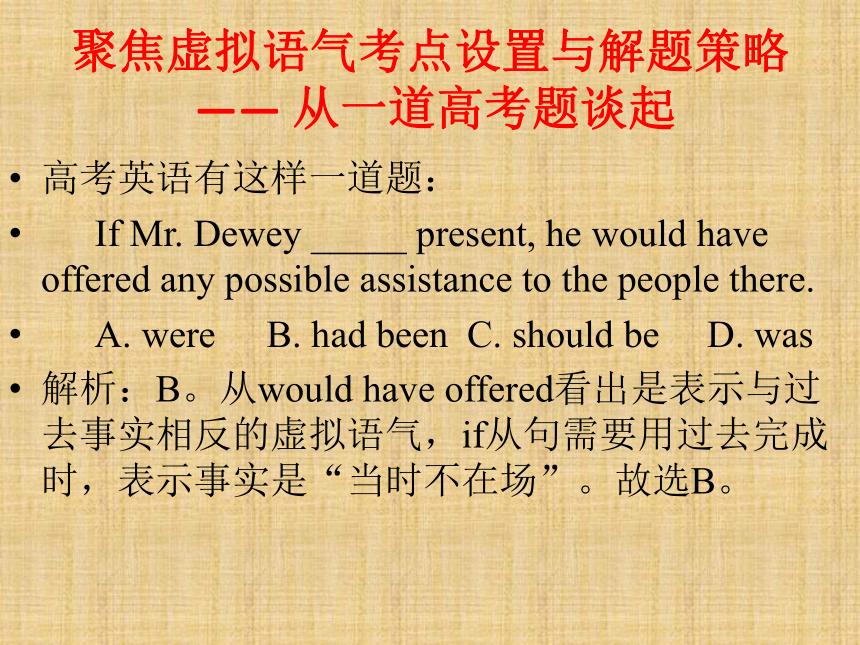 | |
| 格式 | pptx | ||
| 文件大小 | 230.2KB | ||
| 资源类型 | 教案 | ||
| 版本资源 | 通用版 | ||
| 科目 | 英语 | ||
| 更新时间 | 2022-06-04 20:42:07 | ||
图片预览

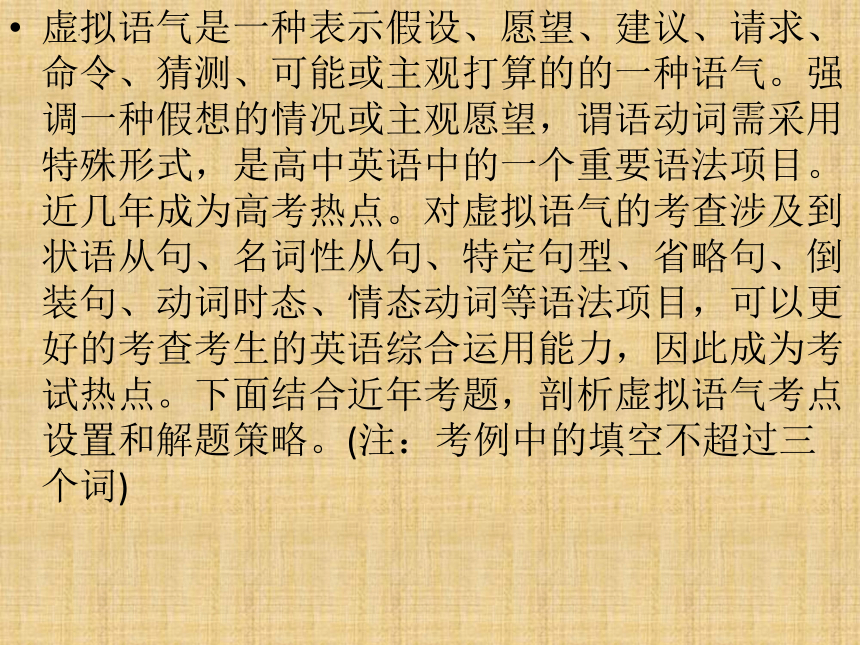
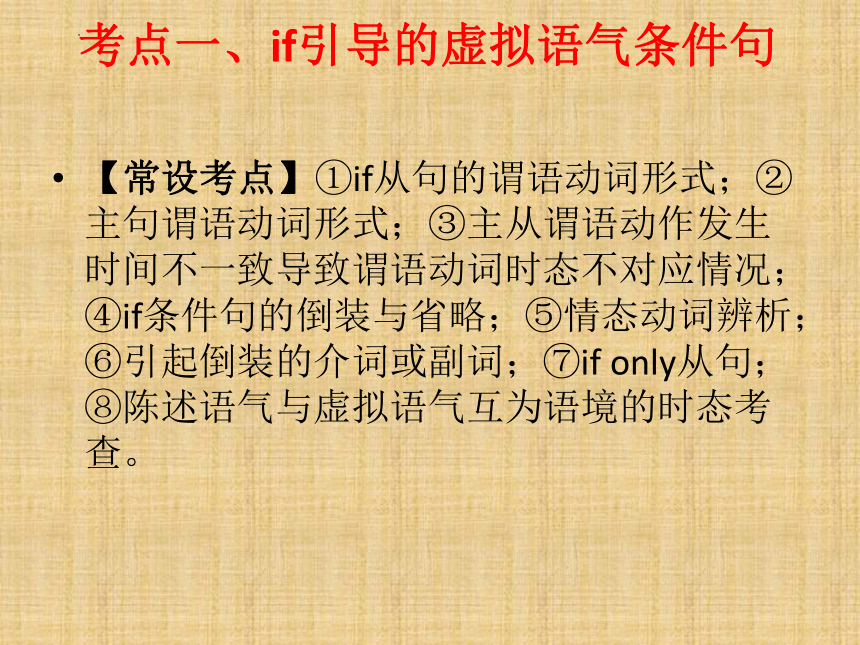
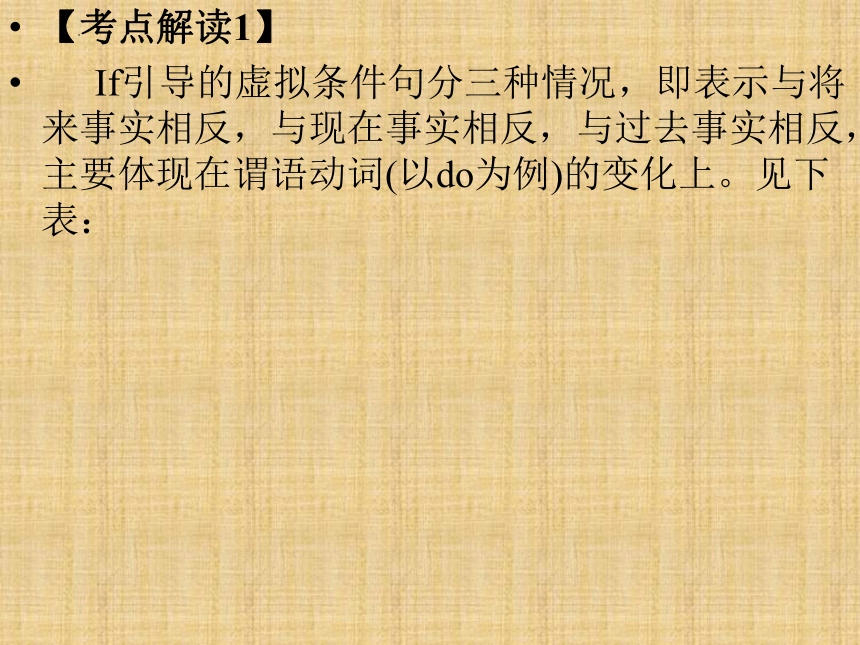
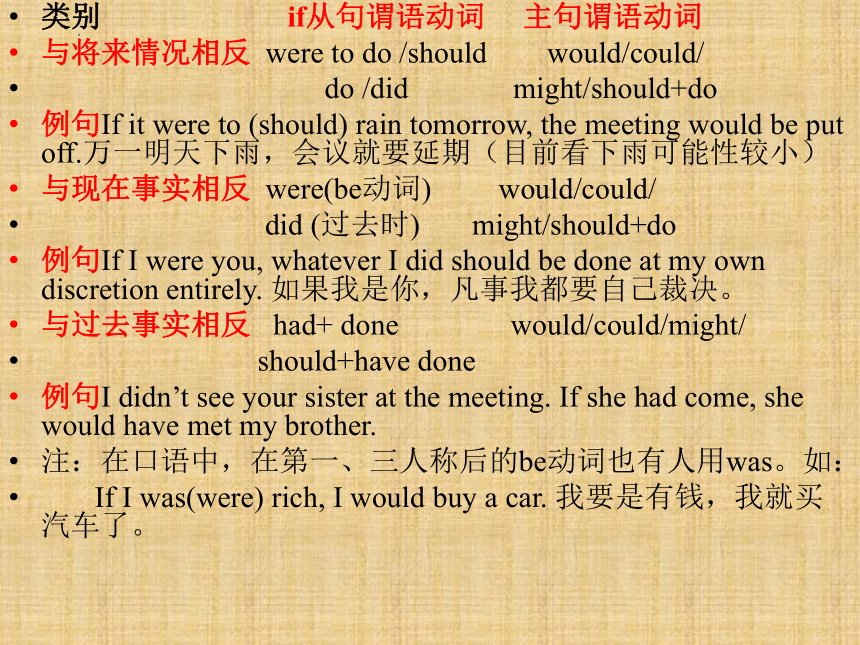

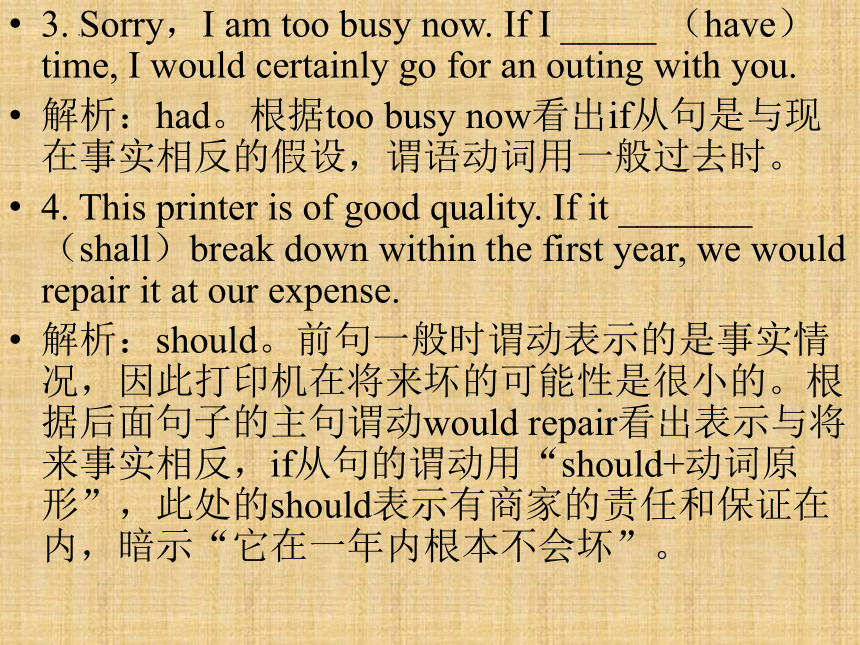
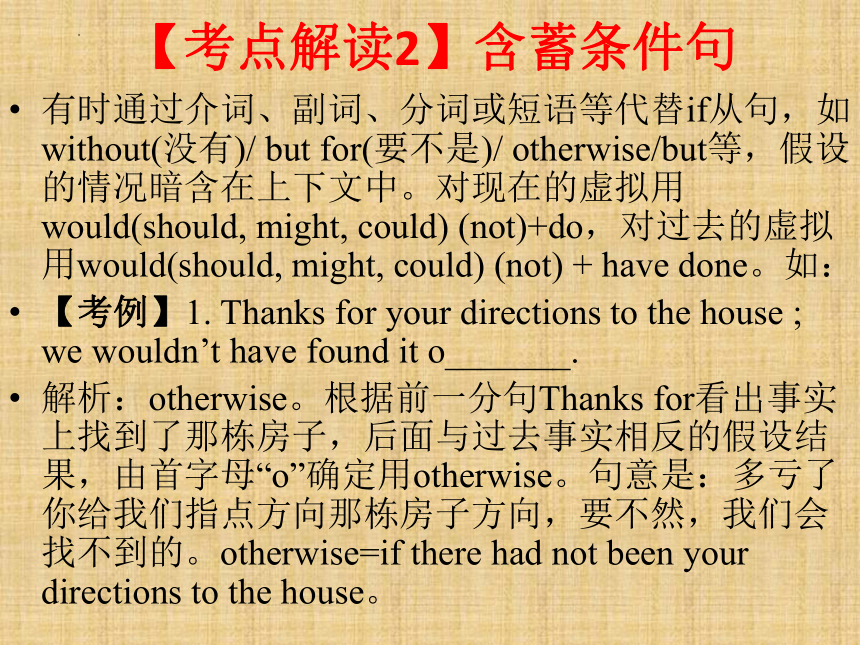
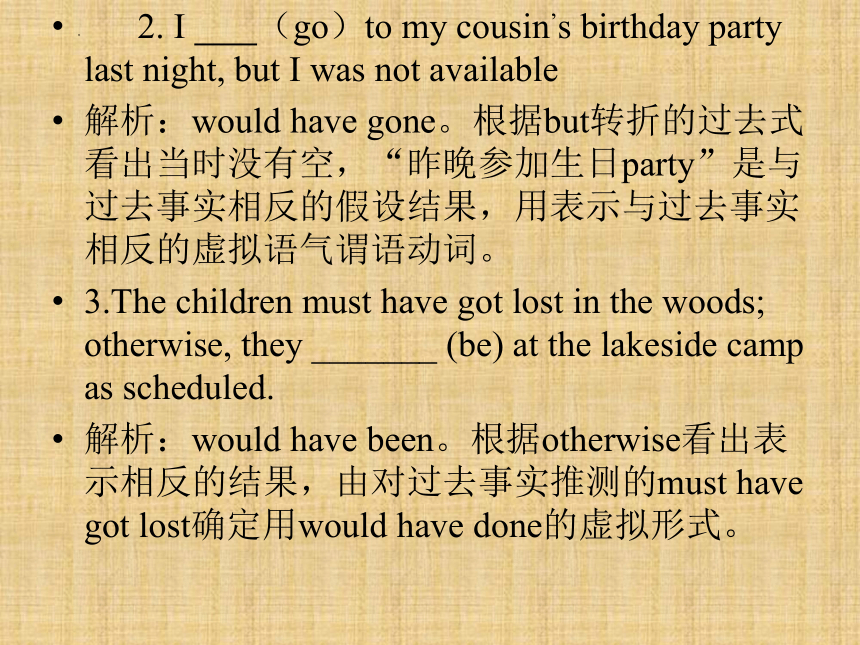
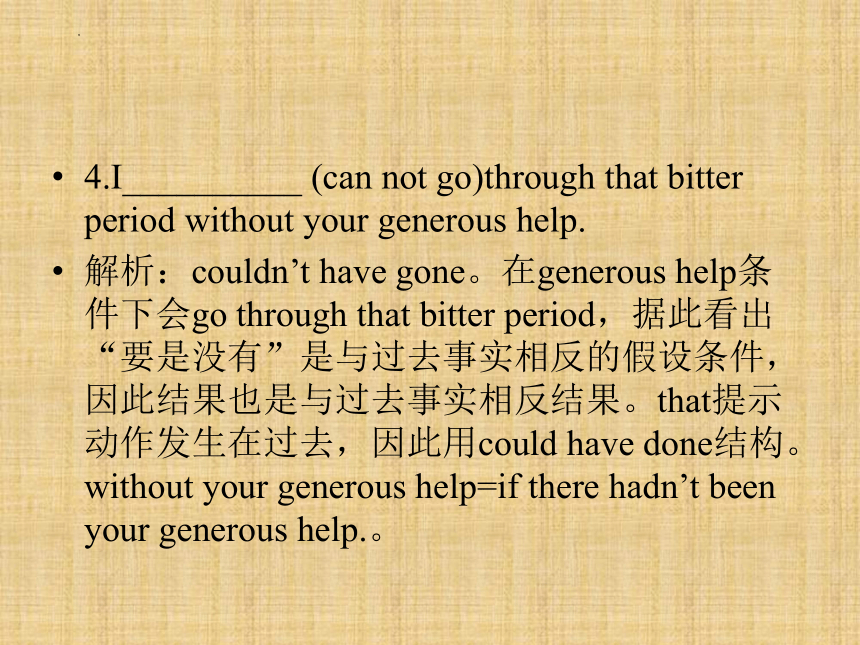
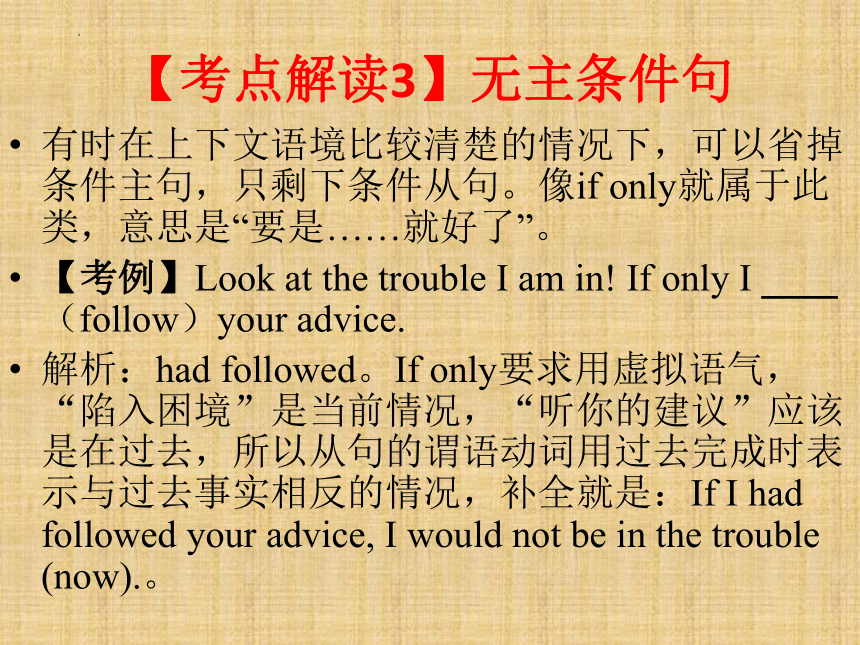
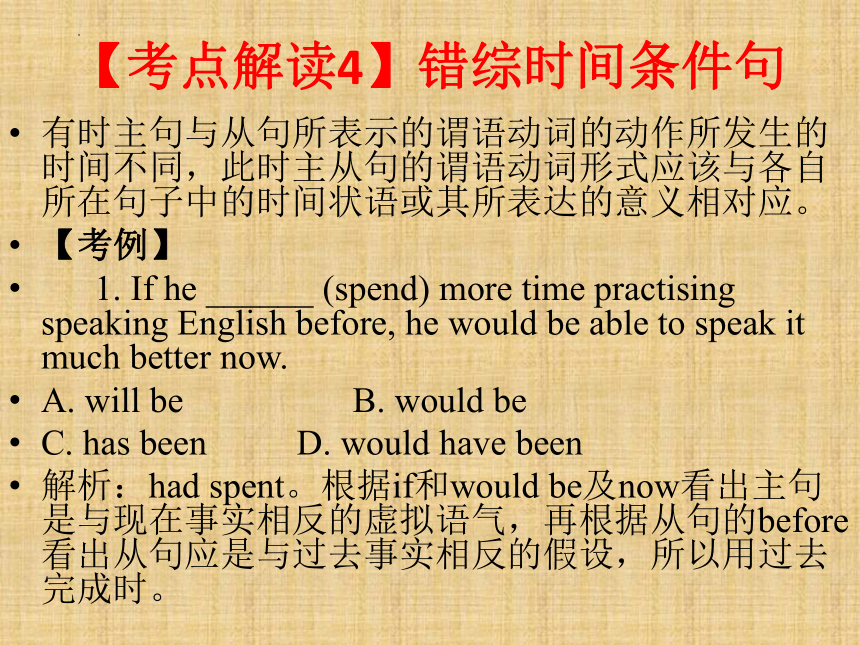
文档简介
(共31张PPT)
聚焦虚拟语气考点设置与解题策略
—— 从一道高考题谈起
高考英语有这样一道题:
If Mr. Dewey _____ present, he would have offered any possible assistance to the people there.
A. were B. had been C. should be D. was
解析:B。从would have offered看出是表示与过去事实相反的虚拟语气,if从句需要用过去完成时,表示事实是“当时不在场”。故选B。
虚拟语气是一种表示假设、愿望、建议、请求、命令、猜测、可能或主观打算的的一种语气。强调一种假想的情况或主观愿望,谓语动词需采用特殊形式,是高中英语中的一个重要语法项目。近几年成为高考热点。对虚拟语气的考查涉及到状语从句、名词性从句、特定句型、省略句、倒装句、动词时态、情态动词等语法项目,可以更好的考查考生的英语综合运用能力,因此成为考试热点。下面结合近年考题,剖析虚拟语气考点设置和解题策略。(注:考例中的填空不超过三个词)
考点一、if引导的虚拟语气条件句
【常设考点】①if从句的谓语动词形式;②主句谓语动词形式;③主从谓语动作发生时间不一致导致谓语动词时态不对应情况;④if条件句的倒装与省略;⑤情态动词辨析;⑥引起倒装的介词或副词;⑦if only从句;⑧陈述语气与虚拟语气互为语境的时态考查。
【考点解读1】
If引导的虚拟条件句分三种情况,即表示与将来事实相反,与现在事实相反,与过去事实相反,主要体现在谓语动词(以do为例)的变化上。见下表:
类别 if从句谓语动词 主句谓语动词
与将来情况相反 were to do /should would/could/
do /did might/should+do
例句If it were to (should) rain tomorrow, the meeting would be put off.万一明天下雨,会议就要延期(目前看下雨可能性较小)
与现在事实相反 were(be动词) would/could/
did (过去时) might/should+do
例句If I were you, whatever I did should be done at my own discretion entirely. 如果我是你,凡事我都要自己裁决。
与过去事实相反 had+ done would/could/might/
should+have done
例句I didn’t see your sister at the meeting. If she had come, she would have met my brother.
注:在口语中,在第一、三人称后的be动词也有人用was。如:
If I was(were) rich, I would buy a car. 我要是有钱,我就买汽车了。
【考例】
1. If we (book) a table earlier, we couldn’t be standing here in a queue.
解析:had booked。根据提示词if和主句谓语动词could have done看出是表示与过去事实相反的虚拟语气,事实上没有早一点预定,从句用过去完成时。
2. —Do you think George has passed the driving test
—No. If so, he _____(drive)his car to our college yesterday.
解析:would have driven。根据答句No看出George没有通过考试是事实情况,yesterday表明if so是与过去事实相反的假设,用would have done形式。
3. Sorry,I am too busy now. If I _____ (have)time, I would certainly go for an outing with you.
解析:had。根据too busy now看出if从句是与现在事实相反的假设,谓语动词用一般过去时。
4. This printer is of good quality. If it _______ (shall)break down within the first year, we would repair it at our expense.
解析:should。前句一般时谓动表示的是事实情况,因此打印机在将来坏的可能性是很小的。根据后面句子的主句谓动would repair看出表示与将来事实相反,if从句的谓动用“should+动词原形”,此处的should表示有商家的责任和保证在内,暗示“它在一年内根本不会坏”。
【考点解读2】含蓄条件句
有时通过介词、副词、分词或短语等代替if从句,如without(没有)/ but for(要不是)/ otherwise/but等,假设的情况暗含在上下文中。对现在的虚拟用would(should, might, could) (not)+do,对过去的虚拟用would(should, might, could) (not) + have done。如:
【考例】1. Thanks for your directions to the house ; we wouldn’t have found it o_______.
解析:otherwise。根据前一分句Thanks for看出事实上找到了那栋房子,后面与过去事实相反的假设结果,由首字母“o”确定用otherwise。句意是:多亏了你给我们指点方向那栋房子方向,要不然,我们会找不到的。otherwise=if there had not been your directions to the house。
2. I (go)to my cousin’s birthday party last night, but I was not available
解析:would have gone。根据but转折的过去式看出当时没有空,“昨晚参加生日party”是与过去事实相反的假设结果,用表示与过去事实相反的虚拟语气谓语动词。
3.The children must have got lost in the woods; otherwise, they _______ (be) at the lakeside camp as scheduled.
解析:would have been。根据otherwise看出表示相反的结果,由对过去事实推测的must have got lost确定用would have done的虚拟形式。
4.I__________ (can not go)through that bitter period without your generous help.
解析:couldn’t have gone。在generous help条件下会go through that bitter period,据此看出“要是没有”是与过去事实相反的假设条件,因此结果也是与过去事实相反结果。that提示动作发生在过去,因此用could have done结构。without your generous help=if there hadn’t been your generous help.。
【考点解读3】无主条件句
有时在上下文语境比较清楚的情况下,可以省掉条件主句,只剩下条件从句。像if only就属于此类,意思是“要是……就好了”。
【考例】Look at the trouble I am in! If only I ____ (follow)your advice.
解析:had followed。If only要求用虚拟语气,“陷入困境”是当前情况,“听你的建议”应该是在过去,所以从句的谓语动词用过去完成时表示与过去事实相反的情况,补全就是:If I had followed your advice, I would not be in the trouble (now).。
【考点解读4】错综时间条件句
有时主句与从句所表示的谓语动词的动作所发生的时间不同,此时主从句的谓语动词形式应该与各自所在句子中的时间状语或其所表达的意义相对应。
【考例】
1. If he ______ (spend) more time practising speaking English before, he would be able to speak it much better now.
A. will be B. would be
C. has been D. would have been
解析:had spent。根据if和would be及now看出主句是与现在事实相反的虚拟语气,再根据从句的before看出从句应是与过去事实相反的假设,所以用过去完成时。
2. It is hard for me to imagine what I would be doing today if I ________(not fall)in love, at the age of seven, with the Melinda Cox Library in my hometown.
解析:had not fallen。根据if和would be doing today看出是虚拟语气,主句是与现状事实相反的情况,从句的at the age of seven提示与过去事实相反,所以用过去完成时。
【考点解读5】虚拟条件句的倒装与省略
如果虚拟条件状语从句中有had/ were/ should,可以把其提至句首,而把连词if省掉,从而形成倒装和省略结构。
【考例】
1. ___ no modern telecommunications, we would have to wait for weeks to get news from around the world.
解析:Were there/If there were/With。根据would have to wait看出前面是表示与现在事实上相反的假设,条件句的谓语动词该用一般过去时,即If there were。由于有were,也可以把were提前,省掉if,则是Were there,也可以用with, with no=without。要注意首字母的大写。
2. ________ (catch) the morning train, he would not have been late for the meeting.
解析:Had he caught。根据主句would not have been late看出过去事实上迟到了,前句“赶上火车”只是对过去事实相反的假设,属于虚拟语气,条件句用过去完成时,即If he had caught,但是这样就四个单词了,根据had转换成倒装Had he caught。
3. _______ (rain) tomorrow, we would not go climbing.
解析:Should it rain/If it rained。 从would not go和tomorrow看出是虚拟语气,前面是对将来事实相反的假设,认为将来rain发生的可能性不大。条件句是If it should rain/ If it were to rain/ If it rained。由于不超过三个词的要求,结合should最终答案确定为Should it rain/If it rained。提示:should和were to结构常用。
4. Had they known what was coming next, they _____ (may/have)second thoughts.
解析:might have had。主句部分Had they known what was coming next=If they had known what was coming next…, 可以看出是与过去事实相反的假设,后面是虚拟的与过去事实相反的结果,虚拟语气中may用might,所以填might have had。句意是:要是他们知道之后会发生什么,他们可能会再三思考的。
考点二、名词性从句中的虚拟语气
【常设考点】①可用虚拟语气的动词、名词、形容词词语辨析;②从句谓语动词的时态。
【考点解读1】宾语从句的虚拟语气
在表示建议、请求、命令、愿望等动词引出的宾语从句中,从句谓动用虚拟语气均为should+动词原形,其中should可以省去 (不用would代替should)。如:suggest(建议)/ propose(提议、建议)/recommend, beg/ insist(坚持)/ ask(要求)/ urge(催促)/ vote(投票决定)/ prefer(宁愿)/ request(要求)/ require(要求、命令)/ demand(要求)/ order(命令)/ command(命令)/ advise(建议)等。如:
【考例】1. My mom suggests that we eat out for a change this weekend.
A. should B. might C. could D. would
解析:should。suggest表示“建议”,宾语从句用虚拟语气should do形式。
2. Eye doctors recommend that a child’s first eye exam _____ (be) at the age of six months old.
解析:should be/be。recommend表示“建议”,宾语从句用虚拟语气should do形式,其中should 可以省掉,所以是should be/be。
注意:suggest表示“暗示,表明”,insist表示“坚持某种事实”,则宾语从句仍用陈述语气,不用虚拟语气。
【考例】Jane’s pale face suggested that she _______(be) ill, and her parents suggested that she _____ (have) a medical examination.
解析:was;should have/ have。本题句意是“简苍白的脸色表明她生病了,父母建议她做个健康检查”。前一分句中suggest的意思是“表明、暗示”,用陈述语气,即用一般过去时was;后一分句的suggest的意思是“建议”,所以宾语从句的谓语动词用虚拟语气,用should have/ have。
注:如果suggest表示“暗示,表明”, insist表示“坚持某种事实”,则宾语从句仍用陈述语气。
【考点解读2】同位语从句及表语从句中的虚拟语气
在suggestion, request,proposal,requirement,command,advice,proposal, wish等名词后跟同位语从句或其作主语后接表语从句时,从句的谓动跟宾语从句一样要用虚拟语气“should+动词原形”。如:
I have accepted the doctor’s suggestion that I (should) give up smoking.
The suggestion that the doctor gave us is that I (should) give up smoking.
What the doctor suggested to me is that I (should) give up smoking.
【典例】The suggestion that students_______(give)more free time is welcomed by many people, for they are too tired with much homework.
解析:should be given/ be given。根据suggestion看出同位语从句表示其具体内容,谓语动词用虚拟语气,再根据give与students是动宾关系需用被动语态,所以填should be given/ be given。
【考点解读3】主语从句中的虚拟语气
在it’s suggested/ proposed/ required/ ordered/ recommended… 或在it’s natural/ necessary/ essential/ urgent/ strange/ a pity /a shame/ no wonder等表示“应该、竟然”等主语从句中,从句常用虚拟语气should do形式,其中should可以省掉。如:
It is required that every employee here should be bale to use computer. What can you do then
【典例】It seemed strange that the man who had developed communism should _______ (live) and died in London.
解析:have lived。根据seemed与live的关系看出live发生在前,再根据strange看出从句有“竟然”的意思,所以是虚拟语气should have lived。
【考点解读4】wish后的宾语从句的虚拟语气
及物动词wish跟宾语从句表示不可能实现的愿望。从句谓动的变化如下:
主句 从句谓动形式 从句谓动时间意义 例句
Sb+Wish would/could /might 表与将来情况相反或
(that) /should+do 将来难以实现的愿望
I sincerely wished that I might do something to comfort him.我诚恳的希望能做点什么来安慰他。
did 与现在事实相反或现在
看来不可能实现的愿望
Sometimes I do wish that I could spend a little more time at home. 有时我真的很想在家里多呆一些时间。
had done 表示与过去事实相反,
表示说话时感遗憾
I wish you had let me know earlier. 我真希望早点告诉我。
【考例】
1. (改编自2011北京卷28) — Where are the children The dinner’s going to be completely ruined.
— I wish they always late.
解析:weren’t。wish后的宾语从句要求用虚拟语气,根据上句“就要吃饭了”和下句always看出“希望不要总是迟到”,谓语动词用一般过去时。
考点三、as if/ as though引导的表语从句或状语从句
【常设考点】①引导词as if/ as though与even if/even though区别;②从句的谓语动词虚拟语气形式;③从句不用虚拟语气的情况。
【考点解读】从句的谓语动词多用虚拟语气,与wish后面的宾语从句的谓语动词相同。当主句的谓语动词是seem/ look/ taste/ smell时,也可以用陈述语气。如:
When a pencil is partly in a glass of water, it looks as if it were broken.
【考例】It was John who broke the window. Why are you talking to me as if I____ (do) it
解析:had done。根据前句的过去时看出从句是表示与过去事实相反的情况,虚拟语气用过去完成时。
考点四、在固定句型中
【常设考点】①would rather do与would rather sb. did区别;②would rather跟从句时谓语动词表示现在与过去的语境设置;③It is (about, high) time+(that)从句谓语动词时态。
【考点解读】主要有两个句型,①would rather sb. did…表示的是将来或现在的事件,表示“主语宁愿某人做某事”; would rather sb. had done 表示过去的事件,表示“主语宁愿某人过去做了某事”。②It is (about, high) time+(that)从句的谓语动词用一般过去时或should +动词原形,此处的should一般不省略。从句中用过去时并不是表示过去,而是表示早该做而未做的事,含有建议的意味。如:
【考例】 1. We would rather our daughter ________ (stay) at home with us, but it is her choice, and she is not a child any longer.
解析:stayed。根据but后的内容看出表示不太可能的事情,谓语动词用一般过去时。注意与would rather do的区别。
2. Jack is a great talker. It’s high time that he _____ something instead of just talking.
解析:did/should do。根据句型It’s high time that确定谓语动词用虚拟语气,用一般过去时did表示现在,也可以用should do。
考点六、其它情况
【常设考点】①特定语境下的句意判断;②谓语动词的词形;③as it were与as it is辨析;④may引起的疑问句与虚拟语气辨析;⑤倒装结构。
【考点解读】①在表示祝愿的句子中,谓语动词多用动词原形,有些祝愿的话用may开头;②在某些成语中包含有虚拟语气的动词。如:
Long live the People’s Republic of China! 中华人民共和国万岁!(谓语动词用原形。)
May all your dreams come true! 祝你的一切梦想成真!(注意句尾不是问号)
He was, as it were, intoxicated by the soft air and sunshine of spring. 他可说是被春天的和风和阳光陶醉了。(as it were 常用作插入语,意思是“姑且这样说、可以说是”。比较:as it is“实际上; 既然如此”)
If need be, help him to do it. 如果有必要,帮他去做。(if need be 意思是“如果有必要”)
聚焦虚拟语气考点设置与解题策略
—— 从一道高考题谈起
高考英语有这样一道题:
If Mr. Dewey _____ present, he would have offered any possible assistance to the people there.
A. were B. had been C. should be D. was
解析:B。从would have offered看出是表示与过去事实相反的虚拟语气,if从句需要用过去完成时,表示事实是“当时不在场”。故选B。
虚拟语气是一种表示假设、愿望、建议、请求、命令、猜测、可能或主观打算的的一种语气。强调一种假想的情况或主观愿望,谓语动词需采用特殊形式,是高中英语中的一个重要语法项目。近几年成为高考热点。对虚拟语气的考查涉及到状语从句、名词性从句、特定句型、省略句、倒装句、动词时态、情态动词等语法项目,可以更好的考查考生的英语综合运用能力,因此成为考试热点。下面结合近年考题,剖析虚拟语气考点设置和解题策略。(注:考例中的填空不超过三个词)
考点一、if引导的虚拟语气条件句
【常设考点】①if从句的谓语动词形式;②主句谓语动词形式;③主从谓语动作发生时间不一致导致谓语动词时态不对应情况;④if条件句的倒装与省略;⑤情态动词辨析;⑥引起倒装的介词或副词;⑦if only从句;⑧陈述语气与虚拟语气互为语境的时态考查。
【考点解读1】
If引导的虚拟条件句分三种情况,即表示与将来事实相反,与现在事实相反,与过去事实相反,主要体现在谓语动词(以do为例)的变化上。见下表:
类别 if从句谓语动词 主句谓语动词
与将来情况相反 were to do /should would/could/
do /did might/should+do
例句If it were to (should) rain tomorrow, the meeting would be put off.万一明天下雨,会议就要延期(目前看下雨可能性较小)
与现在事实相反 were(be动词) would/could/
did (过去时) might/should+do
例句If I were you, whatever I did should be done at my own discretion entirely. 如果我是你,凡事我都要自己裁决。
与过去事实相反 had+ done would/could/might/
should+have done
例句I didn’t see your sister at the meeting. If she had come, she would have met my brother.
注:在口语中,在第一、三人称后的be动词也有人用was。如:
If I was(were) rich, I would buy a car. 我要是有钱,我就买汽车了。
【考例】
1. If we (book) a table earlier, we couldn’t be standing here in a queue.
解析:had booked。根据提示词if和主句谓语动词could have done看出是表示与过去事实相反的虚拟语气,事实上没有早一点预定,从句用过去完成时。
2. —Do you think George has passed the driving test
—No. If so, he _____(drive)his car to our college yesterday.
解析:would have driven。根据答句No看出George没有通过考试是事实情况,yesterday表明if so是与过去事实相反的假设,用would have done形式。
3. Sorry,I am too busy now. If I _____ (have)time, I would certainly go for an outing with you.
解析:had。根据too busy now看出if从句是与现在事实相反的假设,谓语动词用一般过去时。
4. This printer is of good quality. If it _______ (shall)break down within the first year, we would repair it at our expense.
解析:should。前句一般时谓动表示的是事实情况,因此打印机在将来坏的可能性是很小的。根据后面句子的主句谓动would repair看出表示与将来事实相反,if从句的谓动用“should+动词原形”,此处的should表示有商家的责任和保证在内,暗示“它在一年内根本不会坏”。
【考点解读2】含蓄条件句
有时通过介词、副词、分词或短语等代替if从句,如without(没有)/ but for(要不是)/ otherwise/but等,假设的情况暗含在上下文中。对现在的虚拟用would(should, might, could) (not)+do,对过去的虚拟用would(should, might, could) (not) + have done。如:
【考例】1. Thanks for your directions to the house ; we wouldn’t have found it o_______.
解析:otherwise。根据前一分句Thanks for看出事实上找到了那栋房子,后面与过去事实相反的假设结果,由首字母“o”确定用otherwise。句意是:多亏了你给我们指点方向那栋房子方向,要不然,我们会找不到的。otherwise=if there had not been your directions to the house。
2. I (go)to my cousin’s birthday party last night, but I was not available
解析:would have gone。根据but转折的过去式看出当时没有空,“昨晚参加生日party”是与过去事实相反的假设结果,用表示与过去事实相反的虚拟语气谓语动词。
3.The children must have got lost in the woods; otherwise, they _______ (be) at the lakeside camp as scheduled.
解析:would have been。根据otherwise看出表示相反的结果,由对过去事实推测的must have got lost确定用would have done的虚拟形式。
4.I__________ (can not go)through that bitter period without your generous help.
解析:couldn’t have gone。在generous help条件下会go through that bitter period,据此看出“要是没有”是与过去事实相反的假设条件,因此结果也是与过去事实相反结果。that提示动作发生在过去,因此用could have done结构。without your generous help=if there hadn’t been your generous help.。
【考点解读3】无主条件句
有时在上下文语境比较清楚的情况下,可以省掉条件主句,只剩下条件从句。像if only就属于此类,意思是“要是……就好了”。
【考例】Look at the trouble I am in! If only I ____ (follow)your advice.
解析:had followed。If only要求用虚拟语气,“陷入困境”是当前情况,“听你的建议”应该是在过去,所以从句的谓语动词用过去完成时表示与过去事实相反的情况,补全就是:If I had followed your advice, I would not be in the trouble (now).。
【考点解读4】错综时间条件句
有时主句与从句所表示的谓语动词的动作所发生的时间不同,此时主从句的谓语动词形式应该与各自所在句子中的时间状语或其所表达的意义相对应。
【考例】
1. If he ______ (spend) more time practising speaking English before, he would be able to speak it much better now.
A. will be B. would be
C. has been D. would have been
解析:had spent。根据if和would be及now看出主句是与现在事实相反的虚拟语气,再根据从句的before看出从句应是与过去事实相反的假设,所以用过去完成时。
2. It is hard for me to imagine what I would be doing today if I ________(not fall)in love, at the age of seven, with the Melinda Cox Library in my hometown.
解析:had not fallen。根据if和would be doing today看出是虚拟语气,主句是与现状事实相反的情况,从句的at the age of seven提示与过去事实相反,所以用过去完成时。
【考点解读5】虚拟条件句的倒装与省略
如果虚拟条件状语从句中有had/ were/ should,可以把其提至句首,而把连词if省掉,从而形成倒装和省略结构。
【考例】
1. ___ no modern telecommunications, we would have to wait for weeks to get news from around the world.
解析:Were there/If there were/With。根据would have to wait看出前面是表示与现在事实上相反的假设,条件句的谓语动词该用一般过去时,即If there were。由于有were,也可以把were提前,省掉if,则是Were there,也可以用with, with no=without。要注意首字母的大写。
2. ________ (catch) the morning train, he would not have been late for the meeting.
解析:Had he caught。根据主句would not have been late看出过去事实上迟到了,前句“赶上火车”只是对过去事实相反的假设,属于虚拟语气,条件句用过去完成时,即If he had caught,但是这样就四个单词了,根据had转换成倒装Had he caught。
3. _______ (rain) tomorrow, we would not go climbing.
解析:Should it rain/If it rained。 从would not go和tomorrow看出是虚拟语气,前面是对将来事实相反的假设,认为将来rain发生的可能性不大。条件句是If it should rain/ If it were to rain/ If it rained。由于不超过三个词的要求,结合should最终答案确定为Should it rain/If it rained。提示:should和were to结构常用。
4. Had they known what was coming next, they _____ (may/have)second thoughts.
解析:might have had。主句部分Had they known what was coming next=If they had known what was coming next…, 可以看出是与过去事实相反的假设,后面是虚拟的与过去事实相反的结果,虚拟语气中may用might,所以填might have had。句意是:要是他们知道之后会发生什么,他们可能会再三思考的。
考点二、名词性从句中的虚拟语气
【常设考点】①可用虚拟语气的动词、名词、形容词词语辨析;②从句谓语动词的时态。
【考点解读1】宾语从句的虚拟语气
在表示建议、请求、命令、愿望等动词引出的宾语从句中,从句谓动用虚拟语气均为should+动词原形,其中should可以省去 (不用would代替should)。如:suggest(建议)/ propose(提议、建议)/recommend, beg/ insist(坚持)/ ask(要求)/ urge(催促)/ vote(投票决定)/ prefer(宁愿)/ request(要求)/ require(要求、命令)/ demand(要求)/ order(命令)/ command(命令)/ advise(建议)等。如:
【考例】1. My mom suggests that we eat out for a change this weekend.
A. should B. might C. could D. would
解析:should。suggest表示“建议”,宾语从句用虚拟语气should do形式。
2. Eye doctors recommend that a child’s first eye exam _____ (be) at the age of six months old.
解析:should be/be。recommend表示“建议”,宾语从句用虚拟语气should do形式,其中should 可以省掉,所以是should be/be。
注意:suggest表示“暗示,表明”,insist表示“坚持某种事实”,则宾语从句仍用陈述语气,不用虚拟语气。
【考例】Jane’s pale face suggested that she _______(be) ill, and her parents suggested that she _____ (have) a medical examination.
解析:was;should have/ have。本题句意是“简苍白的脸色表明她生病了,父母建议她做个健康检查”。前一分句中suggest的意思是“表明、暗示”,用陈述语气,即用一般过去时was;后一分句的suggest的意思是“建议”,所以宾语从句的谓语动词用虚拟语气,用should have/ have。
注:如果suggest表示“暗示,表明”, insist表示“坚持某种事实”,则宾语从句仍用陈述语气。
【考点解读2】同位语从句及表语从句中的虚拟语气
在suggestion, request,proposal,requirement,command,advice,proposal, wish等名词后跟同位语从句或其作主语后接表语从句时,从句的谓动跟宾语从句一样要用虚拟语气“should+动词原形”。如:
I have accepted the doctor’s suggestion that I (should) give up smoking.
The suggestion that the doctor gave us is that I (should) give up smoking.
What the doctor suggested to me is that I (should) give up smoking.
【典例】The suggestion that students_______(give)more free time is welcomed by many people, for they are too tired with much homework.
解析:should be given/ be given。根据suggestion看出同位语从句表示其具体内容,谓语动词用虚拟语气,再根据give与students是动宾关系需用被动语态,所以填should be given/ be given。
【考点解读3】主语从句中的虚拟语气
在it’s suggested/ proposed/ required/ ordered/ recommended… 或在it’s natural/ necessary/ essential/ urgent/ strange/ a pity /a shame/ no wonder等表示“应该、竟然”等主语从句中,从句常用虚拟语气should do形式,其中should可以省掉。如:
It is required that every employee here should be bale to use computer. What can you do then
【典例】It seemed strange that the man who had developed communism should _______ (live) and died in London.
解析:have lived。根据seemed与live的关系看出live发生在前,再根据strange看出从句有“竟然”的意思,所以是虚拟语气should have lived。
【考点解读4】wish后的宾语从句的虚拟语气
及物动词wish跟宾语从句表示不可能实现的愿望。从句谓动的变化如下:
主句 从句谓动形式 从句谓动时间意义 例句
Sb+Wish would/could /might 表与将来情况相反或
(that) /should+do 将来难以实现的愿望
I sincerely wished that I might do something to comfort him.我诚恳的希望能做点什么来安慰他。
did 与现在事实相反或现在
看来不可能实现的愿望
Sometimes I do wish that I could spend a little more time at home. 有时我真的很想在家里多呆一些时间。
had done 表示与过去事实相反,
表示说话时感遗憾
I wish you had let me know earlier. 我真希望早点告诉我。
【考例】
1. (改编自2011北京卷28) — Where are the children The dinner’s going to be completely ruined.
— I wish they always late.
解析:weren’t。wish后的宾语从句要求用虚拟语气,根据上句“就要吃饭了”和下句always看出“希望不要总是迟到”,谓语动词用一般过去时。
考点三、as if/ as though引导的表语从句或状语从句
【常设考点】①引导词as if/ as though与even if/even though区别;②从句的谓语动词虚拟语气形式;③从句不用虚拟语气的情况。
【考点解读】从句的谓语动词多用虚拟语气,与wish后面的宾语从句的谓语动词相同。当主句的谓语动词是seem/ look/ taste/ smell时,也可以用陈述语气。如:
When a pencil is partly in a glass of water, it looks as if it were broken.
【考例】It was John who broke the window. Why are you talking to me as if I____ (do) it
解析:had done。根据前句的过去时看出从句是表示与过去事实相反的情况,虚拟语气用过去完成时。
考点四、在固定句型中
【常设考点】①would rather do与would rather sb. did区别;②would rather跟从句时谓语动词表示现在与过去的语境设置;③It is (about, high) time+(that)从句谓语动词时态。
【考点解读】主要有两个句型,①would rather sb. did…表示的是将来或现在的事件,表示“主语宁愿某人做某事”; would rather sb. had done 表示过去的事件,表示“主语宁愿某人过去做了某事”。②It is (about, high) time+(that)从句的谓语动词用一般过去时或should +动词原形,此处的should一般不省略。从句中用过去时并不是表示过去,而是表示早该做而未做的事,含有建议的意味。如:
【考例】 1. We would rather our daughter ________ (stay) at home with us, but it is her choice, and she is not a child any longer.
解析:stayed。根据but后的内容看出表示不太可能的事情,谓语动词用一般过去时。注意与would rather do的区别。
2. Jack is a great talker. It’s high time that he _____ something instead of just talking.
解析:did/should do。根据句型It’s high time that确定谓语动词用虚拟语气,用一般过去时did表示现在,也可以用should do。
考点六、其它情况
【常设考点】①特定语境下的句意判断;②谓语动词的词形;③as it were与as it is辨析;④may引起的疑问句与虚拟语气辨析;⑤倒装结构。
【考点解读】①在表示祝愿的句子中,谓语动词多用动词原形,有些祝愿的话用may开头;②在某些成语中包含有虚拟语气的动词。如:
Long live the People’s Republic of China! 中华人民共和国万岁!(谓语动词用原形。)
May all your dreams come true! 祝你的一切梦想成真!(注意句尾不是问号)
He was, as it were, intoxicated by the soft air and sunshine of spring. 他可说是被春天的和风和阳光陶醉了。(as it were 常用作插入语,意思是“姑且这样说、可以说是”。比较:as it is“实际上; 既然如此”)
If need be, help him to do it. 如果有必要,帮他去做。(if need be 意思是“如果有必要”)
